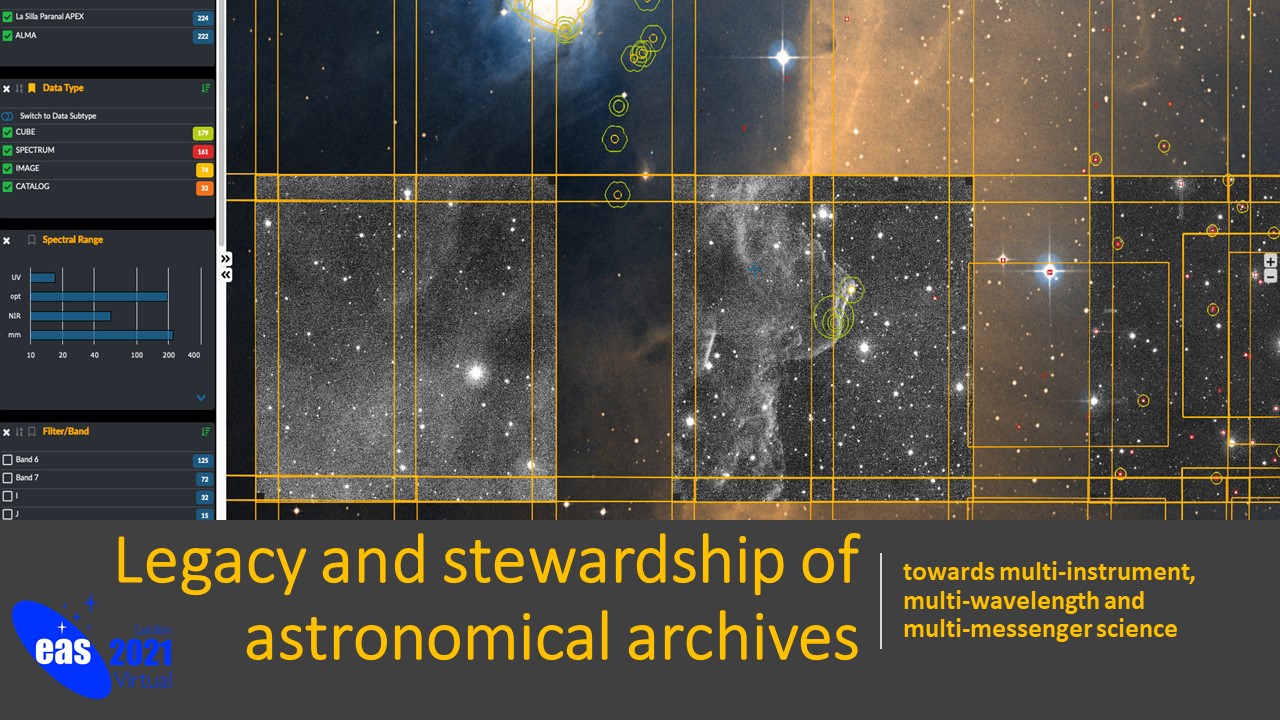Special Session SS14
30 June 2021
Legacy and stewardship of astronomical archives towards multi-instrument, multi-wavelength and multi-messenger science
Aims and scope
 Many investigations about the formation and evolution of our Universe, galaxies, stars, and planets can be tackled with the scientific exploration of archival data alone or with new observations. Multi-messenger, multi-instrument, and multi-epoch observations open a N-dimensional parameter space with unprecedented perspective on open questions in astronomical research. The discovery of the transient electromagnetic counterpart of the gravitational wave signal GW170817 is an exemplary result achieved from the synergy of joint world-wide dedicated observations (multi-messenger and multi-wavelength) with archive science (exploration of the time domain and long-term preservation of previously acquired data). Such synergies will become even so important once the new facilities, e.g. ELT, the Vera Rubin telescope (transient) and JWST, reach first light and start surveying the skies with their optimized complementary observing techniques and parameters.
Many investigations about the formation and evolution of our Universe, galaxies, stars, and planets can be tackled with the scientific exploration of archival data alone or with new observations. Multi-messenger, multi-instrument, and multi-epoch observations open a N-dimensional parameter space with unprecedented perspective on open questions in astronomical research. The discovery of the transient electromagnetic counterpart of the gravitational wave signal GW170817 is an exemplary result achieved from the synergy of joint world-wide dedicated observations (multi-messenger and multi-wavelength) with archive science (exploration of the time domain and long-term preservation of previously acquired data). Such synergies will become even so important once the new facilities, e.g. ELT, the Vera Rubin telescope (transient) and JWST, reach first light and start surveying the skies with their optimized complementary observing techniques and parameters.
Clearly, the legacy and cross utilization of the content of these scientific archives, together with new observations, can be achieved if the stewardship is effective, i.e. level and accuracy of the calibrations are well documented, and the archival data are easily discoverable from a uniform, public interface across diversified services/ archives. The goal of this special session is to bring together science users, data providers, and archive infrastructure experts to identify the needs on the legacy (long term preservation), stewardship (data curation) and discoverability of the content of the science archives. The yearly meeting of the European Astronomical Society is the catalyser for such stimulating exchange to take place and forge the requirements for the science archives to support the scientific investigation into the next decade.
Programme
This special session will address the following questions:
- SCIENTIFIC VALUE: What are the requirements to allow an efficient harvesting of science data in the future?
- LEGACY VALUE: How it is possible to guarantee that the information is not degraded/lost with time?
- STEWARDSHIP VALUE: How to bring the data content to be interoperable and usable for future science exploitation?
More in general, the session aims to trigger the discussion to define how to increase the value of the diversified of data content currently present (and exponentially growing) on different archive systems.
Invited speakers
- Martino Romaniello (ESO)
- Rosie Bolton (SKA)
- Bruno Merin (ESA)
- Barbara Patricelli (INFN, Pisa)
- Gijs Verdoes (Kapteyn Inst.)
- Sebastien Derriere (CDS)
Scientific organisers
Chair: Magda Arnaboldi (ESO)
SOC members:
Mark Allen (Strasbourg),
Christophe Arviset (ESA),
Elena Cuoco (EGO/VIRGO),
Stephen Gwyn (CADC),
Paolo Padovani (ESO),
Josh Peek (STSCI, MAST),
Michael Sterzik (ESO)
Contact
marnabol @ eso.org
Updated on Wed Feb 24 12:04:28 CET 2021
|